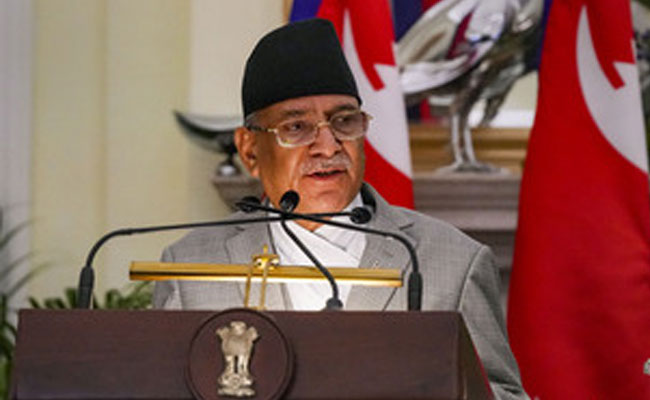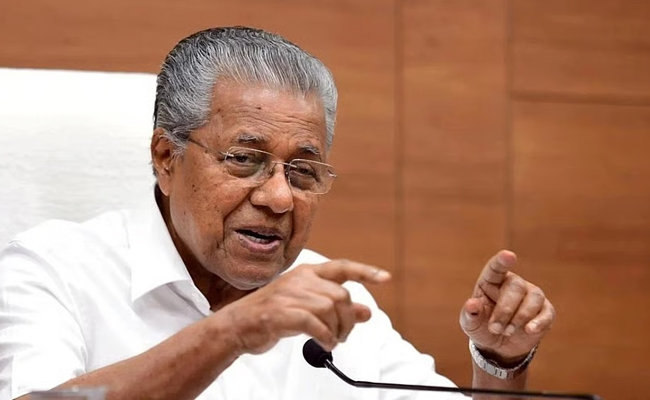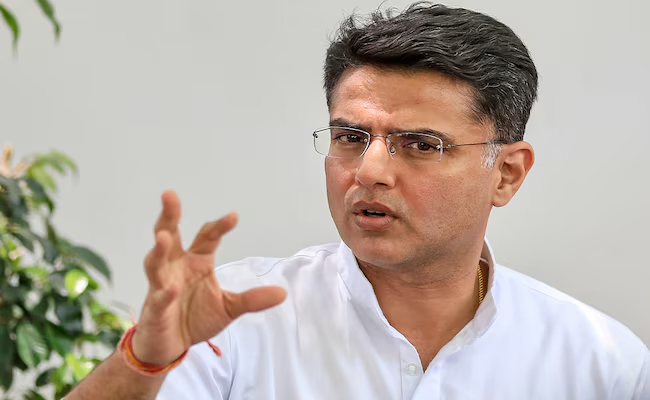Kathmandu (PTI): A Nepali student who went missing after a farm in Israel was attacked by Hamas has been taken hostage by the Palestine militant group and efforts are on to find him with the help of international organisations, the Nepal government said on Sunday.
Hamas carried out a barrage of air strikes in Southern Israel on Saturday last which killed 10 Nepali students. Six students were rescued and one went missing. The 17 Nepalese students were working as interns on the farm under the 'Learn and Earn' scheme.
Bipin Joshi, who saved the lives of other Nepalese students when Hamas launched a grenade attack on them, has been abducted by the militant group, Foreign Minister N P Saud told a select group of international media representatives at his residence here.
"Joshi has been taken hostage by Hamas. Based on information from his colleagues, Hamas took Joshi as a hostage and a group of Thai nationals. The Nepal government has requested international organisations and diplomatic missions to assist in locating Joshi," he said.
Joshi even threw away one of the two unexploded grenades, which were hurled by the Hamas on them, Saud said.
"The Israeli government has taken control of the dead bodies of the 10 Nepalese students killed in the terrorist attack," he said.
"I spoke with Israel's Foreign Minister (Eli Cohen) on the matter, and we are working towards bringing back the bodies at the earliest. The Nepalese ambassador to Israel has also expressed a commitment to bringing back the bodies to Nepal as soon as possible," Saud said.
The Nepal government has also issued a travel advisory for its citizens, urging them not to visit Israel unless absolutely necessary and to exercise extreme caution and take necessary safety measures in case the travel is urgent.
Nepal wants a peaceful resolution of the Middle East issue, Saud said in reply to a question.
"The attack on our students, some of whom are very young, below 20 years, by Hamas is deplorable," he said.
Hamas targeted the Nepalese students, who were hiding in a bunker, with multiple attacks, including grenade explosions and gunfire, Saud said.
One of the seriously injured students is currently receiving treatment in Israel, he said.
Around 200 Nepalese nationals working in different fields in Israel have filled online forms expressing their desire to return home and the government will soon make some arrangements for their repatriation, the foreign minister said.
On Friday, a group of 254 Nepali students rescued from Israel arrived in Kathmandu.
According to the Ministry of Foreign Affairs, there were 265 students from Nepal studying under the Israel government-funded 'Learn and Earn' scheme in different parts of Israel, and about 4,500 Nepali citizens working in various professional fields.
Let the Truth be known. If you read VB and like VB, please be a VB Supporter and Help us deliver the Truth to one and all.
Thiruvananthapuram (PTI): The Kerala government on Monday assured stringent action in the mob lynching of a Chattisgarh native mistaken to be a thief, and promised justice to the family, even as the ruling CPI(M) targeted the RSS over the assault, a charge denied by the BJP.
Ramnarayan (31), was allegedly beaten to death on Wednesday after being accused of involvement in theft at Kizhakeattappallam near Walayar in Palakkad district.
With the issue sending shock waves across the state, Chief Minister Pinarayi Vijayan on Monday described the incident as "deeply disturbing".
Assuring justice to his family, who have arrived in the state, Vijayan said such acts tarnish the reputation of a progressive society like Kerala and are completely unacceptable.
State minister M B Rajesh claimed racial slurs were made at the victim and that the attackers were RSS workers. Ruling CPI (M) state secretary M V Govindan also alleged that RSS-BJP workers were behind the crime.
ALSO READ: After Hadi, another Bangladesh student leader shot in head
In a statement issued by the CM's office, Vijayan said strict action would be taken against those responsible for the crime.
A special investigation team of the district police is probing the incident, he said, adding that instructions have been issued to thoroughly examine the details of the case and initiate all necessary legal proceedings.
The government will also review the matter and ensure appropriate compensation to the victim's family, Vijayan added.
He called for collective vigilance to prevent the recurrence of such incidents in the future.
His remarks came a day after opposition Congress and the victim's family demanded compensation and an investigation under stringent laws, including the SC/ST (Prevention of Atrocities) Act.
The brother of deceased man told reporters on Sunday that the family would not accept the body until their demands, including compensation of Rs 25 lakh, are met.
Kerala ministers K Rajan and Rajesh strongly condemned the incident and said it was not just a mob lynching case but racial abuse was involved in it.
The ministers said the accused had attacked the deceased man, calling him a "Bangladeshi" and beat him to death.
"The government will ensure a foolproof probe into the incident, and no one involved in the crime will be spared," Revenue Minister Rajan told reporters in Thrissur.
He said an amount not less than Rs 10 lakh would be granted from the Chief Minister's Distress Relief Fund (CMDRF) to the deceased man's family and a cabinet meeting would take a decision in this regard.
LSGD Minister Rajesh also said Ramnarayan was branded as a Bangladeshi by the attackers.
While talking to reporters in Palakkad, he alleged that those who brutally assaulted and killed Ramnarayan were RSS workers.
The Chhattisgarh native, who reached Kerala in search of a job, became a victim of the "divisive politics" of Sangh Parivar, Rajesh further alleged.
"Branding a person as Bangladeshi came from racial politics. Ramnarayan was a victim of the racial poison spread by the Sangh Parivar in the country," he charged.
Rajesh also accused a section of the media of hiding the involvement of the RSS in the assault.
Stepping up the attack against the right-wing groups, CPI (M) state secretary M V Govindan alleged that RSS-BJP workers were the ones behind the crime.
"Those involved in the incident were accused in various criminal cases of RSS. All of them were identified. Such cruelties should not be allowed to repeat in the state," he said.
Expressing strong protest, the senior leader further said a society which believes in democratic values and secular principles cannot accept such crimes.
Senior BJP leader Kummanam Rajasekharan strongly rejected the charges against the saffron party and the RSS.
"Actually, why is politics mixed in such crimes. When a heinous crime like mob lynching happens, should it not be treated as an anti-social act," he told reporters here.
Leader of Opposition in the state Assembly, V D Satheesan urged the government to take urgent steps to provide financial assistance to the family of Ramnarayan.
Meanwhile, Palakkad Superintendent of Police Ajit Kumar said at present, the case was registered under sections of murder, and after a detailed probe, more would be added.
After verifying the caste certificate of the deceased man, SC/ST (Prevention of Atrocities) Act would also be invoked, he told reporters in Palakkad.
A 10-member Special Investigation Team (SIT) has been formed under the DSP (district crime branch) to probe the mob lynching incident. The SIT will be under the direction and supervision of the Pakakkad SP, he added.
ALSO READ: 17-year-old PUC student in Shivamogga drowns while swimming in River Tunga
When reporters asked about the political background of the accused persons, the officer said it was being verified.
He said that the arrested persons were already facing police cases.
Five people have been arrested so far for allegedly beating Ramnarayan to death on suspicion of theft.
The injured man was rushed to the Palakkad District Government Hospital, where he later succumbed to his injuries.





